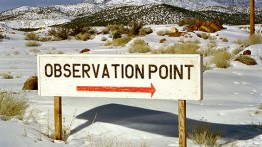Interdisciplinary Lecture Series: Matthew Coolidge
Monday, April 27, 2015, 6:30 - 8pm

Image courtesy of the CLUI
Matthew Coolidge, the founder and Director of the Center for Land Use Interpretation will deliver a free, public lecture on "Anthropogeomorphology and the Center for Land Use Interpretation." The Center, an education and research organization based in Los Angeles, produces exhibitions, presentations, tours, publications, online resources and other public programs that examine, describe and explain the built landscape of the United States.
This spring, The Cooper Union School of Art presents a series of lectures, reflecting a broad range of contemporary art issues. Speakers include artists, writers, and thinkers currently engaged in a variety of practices. The emphasis is on interdisciplinary approaches, presenting new voices, international perspectives and scholarship across multiple fields. The series constitutes a lively forum for the exchange of ideas between practitioners, students, faculty and the public.
The Spring 2015 IDL series is part of the Robert Lehman Visiting Artist Program.
We are grateful for major funding support from the Robert Lehman Foundation.
Located in the Frederick P. Rose Auditorium, at 41 Cooper Square (on Third Avenue between 6th and 7th Streets)




